- Home
- W. Somerset Maugham
(1941) Up at the Villa
(1941) Up at the Villa Read online
UP AT THE VILLA
William Somerset Maugham
1
THE villa stood on the top of a hill. From the terrace in front of it you had a magnificent view of Florence; behind was an old garden, with few flowers, but with fine trees, hedges of cut box, grass walks and an artificial grotto in which water cascaded with a cool, silvery sound from a cornucopia. The house had been built in the sixteenth century by a noble Florentine, whose impoverished descendants had sold it to some English people, and it was they who had lent it for a period to Mary Panton. Though the rooms were large and lofty, it was of no great size and she managed very well with the three servants they had left her. It was somewhat scantily furnished with fine old furniture and it had an air; and though there was no central heating, so that when she had arrived at the end of March it had been still bitterly cold, the Leonards, its owners, had put in bathrooms and it was comfortable enough to live in. It was June now and Mary spent most of the day, when she was at home, on the terrace from which she could see the domes and towers of Florence, or in the garden behind.
For the first few weeks of her stay she had spent much time seeing the sights: she passed pleasant mornings at the Uffizi and the Bargello, she visited the churches and wandered at random in old streets; but now she seldom went down to Florence except to lunch or dine with friends. She was satisfied to lounge about the garden and read books, and if she wanted to go out she preferred to get into the Fiat and explore the country round about. Nothing could have been more lovely with its sophisticated innocence than that Tuscan scene. When the fruit trees were in blossom and when the poplars burst into leaf, their fresh colour crying aloud amid the grey evergreen of the olives, she had felt a lightness of spirit she had thought never to feel again. After the tragic death of her husband, a year before, after the anxious months when she had to be always on hand in case the lawyers who were gathering together what was left of his squandered fortune wanted to see her, she had been glad to accept the Leonards' offer of this grand old house so that she could rest her nerves and consider what she should do with her life. After eight years of extravagant living, and an unhappy marriage, she found herself at the age of thirty with some fine pearls and an income just large enough, with rigid economy, for her support. Well, that was better than it had looked at first when the lawyers, with glum faces, had told her that after the debts were paid they were afraid that nothing would be left at all. At this moment, with two and a half months in Florence behind her, she felt that she could have faced even that prospect with serenity. When she left England the lawyer, an old man and an old friend, had patted her hand.
`Now you've got nothing to worry about, my dear,' he said, `except to get back your health and strength. I don't say anything about your looks because nothing affects them. You're a young woman and a very pretty one, and I have no doubt you'll marry again. But don't marry for love next time; it's a mistake; marry for position and companionship.’
She laughed. She had had a bitter experience and had no intention then of ever hazarding again the risks of wedlock; it was odd that now she was contemplating doing exactly what the shrewd old lawyer had advised. It looked indeed as though she would have to make up her mind that very afternoon. Edgar Swift was even then on his way to the villa. He had called up a quarter of an hour before to say that he had unexpectedly to go to Cannes to meet Lord Seafair and was starting at once, but urgently wanted to see her before he went. Lord Seafair was the Secretary of State for India and this sudden summons could only mean that Edgar was after all going to be offered the distinguished position upon which he had set his heart. Sir Edgar Swift, K.C.S.I., was in the Indian Civil Service, as her father had been, and he had had a distinguished career. He had been for five years Governor of the North-West Provinces and during a period of great unrest had conducted himself with conspicuous ability. He had finished his term with the reputation of being the most capable man in India. He had proved himself a great administrator; though resolute he was tactful, and if he was peremptory he was also generous and moderate. The Hindus and the Muslims liked and trusted him. Mary had known him all her life. When her father died, still a young man, and she and her mother had returned to England, Edgar Swift, whenever he came home on leave, spent a great part of his time with them. As a child he took her to the pantomime or the circus; as a girl in her teens, to the pictures or to the theatre; he sent her presents for her birthday and at Christmas. When she was nineteen her mother had said to her:
`I wouldn't see too much of Edgar if I were you, darling. I don't know if you've noticed it, but he's in love with you' Mary laughed.
`He's an old man.’
`He's forty-three,' her mother answered tartly.
But he had given her some beautiful Indian emeralds when two years later she married Matthew Panton, and when he had discovered that her marriage was unhappy he had been wonderfully kind. On the expiration of his term as Governor he had gone to London and finding she was in Florence he had come down to pay her a brief visit. He had stayed week after week and Mary would have been a fool not to see that he was waiting for the favourable moment to ask her to marry him. How long had he been in love with her? Looking back, she thought it was ever since she was fifteen, when he had come home on leave and found her no longer a child but a young girl. It was rather touching, that long fidelity. And of course there was a difference between the girl of nineteen, the man of forty-three; and the woman of thirty, the man of fifty-four. The disparity seemed much less. And he was no longer an unknown Indian civilian; he was a man of consequence. It was absurd to suppose that the Government would be content to dispense with his services; he was certainly destined to hold positions of increasing importance. Mary's mother was dead too now, she had no other relations in the world; there was no one of whom she was so fond as of Edgar.
`I wish I could make up my mind,' she said.
He couldn't be long now. She wondered whether she should receive him in the drawing-room of the villa, mentioned in the guide books for its frescoes by the younger Ghirlandaio, with its stately Renaissance furniture and its magnificent candelabra; but it was a formal, sumptuous room, and she felt it would give the occasion an awkward solemnity: it would be better to wait for him on the terrace where she was fond of sitting toward evening to enjoy the view of which she never tired. It seemed a little more casual. If he were really going to ask her to marry him, well, it would make it easier for both of them, out in the open air, over a cup of tea, while she was nibbling a scone. The setting was seemly and not unduly romantic. There were orange trees in tubs and marble sarcophagi brimming over with gaily wanton flowers. The terrace was protected by an old stone balustrade on which at intervals were great stone vases and at each end a somewhat battered statue of a baroque saint.
Mary lay down in a long cane chair and toll Nina, the maid, to bring tea. Another chair waited for Edgar. There was not a cloud in the sky, and the city below, in the distance, was bathed in the soft clear brilliance of the June afternoon. She heard a car drive up. A moment later, Ciro, the Leonards' manservant and Nina's husband, ushered Edgar on to the terrace. Tall and spare in his well-cut blue serge and a black Homburg, he looked both athletic and distinguished. Even had she not known, Mary would have guessed that he was a good tennis player, a fine rider and an excellent shot. Taking off his hat he displayed a thick head of black curling hair hardly touched with grey. His face was bronzed by the Indian sun, a lean face with a strong chin and an aquiline nose; his brown eyes under the heavy brows were deep-set and vigilant. Fifty-four? He did not look a day more than forty-five. A handsome man in the prime of life. He had dignity without arrogance. He inspired you with confidence. Here was a fellow whom no predicament could per
plex and no accident discompose. He wasted no time on small talk.
`Seafair called me on the phone this morning and definitely offered me the governorship of Bengal. They've made up their minds that in view of the circumstances they don't want to bring out a man from England who would have to learn the conditions before he could be of use, but someone who is already familiar with them.’
`Of course you accepted.’
`Of course. It's the job of all others that I wanted.’
`I'm so glad.’
`But there are various things to discuss and I've arranged to go to Milan this evening and get a plane from there to Cannes. I shall be away two or three days, which is a bore. but Seafair was anxious that we should meet at once.
`That's only natural.’
A pleasing smile broke on his firm, somewhat thin-upped mouth and his eyes shone softly.
`You know, my dear, this is a very important position I'm going to take up. If I make a success of it, it'll be. well, rather a feather in my cap.’
`I'm sure you'll make a success of it.’
`It means a lot of work and a lot of responsibility. But that's what I like. Of course it has its compensations. The Governor of Bengal lives in a good deal of state and I don't mind telling you that that somewhat appeals to me. It's a fine house he lives in too, almost a palace. I shall have to do a lot of entertaining.’
She saw what this was leading to, but looked at him with a bright, sympathetic smile on her lips, as though she had no notion. She was pleasantly excited.
`Of course a man ought to have a wife for a job like that,' he went on.
`It's very difficult for a bachelor.’
Her eyes were wonderfully candid when she replied.
`I'm quite sure there are plenty of eligible females who would be glad to share your grandeur.’
`I haven't lived in India for nearly thirty years without having a pretty shrewd suspicion that there's something in what you say. The unfortunate thing is that there's only one eligible female that I would ever dream of asking to do that'
Now it was coming. Should she say yes or no? Oh dear, oh dear, it was very difficult to make up one's mind. He gave her a glance that was slightly arch.
`Am I telling you something you don't know when I tell you that I've been head over heels in love with you since you were a kid with bobbed hair?' What did one say to that? One laughed brightly.
`Oh, Edgar, what nonsense you talk.’
`You're the most beautiful creature I've ever seen in my life and the most delightful. Of course I knew I hadn't a chance. I was twenty-five years older than you. A contemporary of your father's. I had a pretty shrewd suspicion that when you were a girl you looked upon me as a funny old fogey.’
`Never,' cried Mary, not quite truthfully.
`Anyway, when you fell in love it was natural enough that it should be with someone of your own generation. I ask you to believe me when I tell you that when you wrote and told me you were going to be married I only hoped you would be very happy. I was miserable when I discovered you weren't.’
`Perhaps Mattie and I were too young to marry.’
`A lot of water has flowed under the bridges since then. I was wondering if now the discrepancy of our ages seemed as important to you as it did then.’
That was such a difficult question to answer that Mary thought it much better to say nothing but leave him to continue.
`I've always taken care to keep myself pretty fit, Mary. I don't feel my age. But the worst of it is, the years have had no effect on you except to make you more beautiful than ever.’
She smiled.
`Is it possible that you're a little nervous, Edgar? That's something I never expected to see you. You, the man of iron.’
`You're a little monster. But you're quite right, I am nervous; and so far as the man of iron is concerned, no one knows better than you that in your hands I've never been anything but a lump of putty.’
`Am I right in thinking that you're proposing to me?’
`Quite right. Are you shocked or surprised?’
`Certainly not shocked. You know, Edgar, I'm very fond of you. I think you're the most wonderful man I've ever known. I'm terribly flattered that you should want to marry me.
`Then will you?'
There was a curious sense of apprehension in her heart He was certainly very handsome. It would be thrilling to be the wife of the Governor of Bengal and very nice to be grand and to have A.D.Cs running about to do one's bidding.
`You say you'll be away two or three days?’
`Three at the outside. Seafair has to go back to London.’
`Will you wait for an answer till you come back?’
`Of course. In the circumstances I think it's very reasonable. I'm sure it's much better that you should know your own mind, and I take it that if you definitely knew the answer would be "No" - you wouldn't have to think it over.’
`That's true,' she smiled.
`Then we’ll leave it at that. I'm afraid I must go now if I don't want to miss my train.’
She walked with him to his taxi.
`By the way, have you toll the Princess you wouldn't be able to go tonight?' They had both been going to a dinner party which the old Princess San Ferdinando was giving that evening.
`Yes, I called her up_ and told her that I was obliged to leave Florence for a few days.’
`Did you tell her why? You know what an old tyrant she is,' he smiled indulgently.
`She told me off good and proper for throwing her over at the last moment and in the end I had to confess the truth.’
`Oh, well, she'll find someone to take your place,' Mary replied casually.
`I trust you'll take Ciro with you as I shan't be able to come and fetch you.’
`I can't. I told Ciro and Nina that they could go out.’
`I think it's terribly unsafe for you to drive along these - deserted roads by yourself at all hours of the night But you'll keep your promise to me, won't you?”
‘What promise? Oh, the revolver. I think it's perfectly ridiculous, the roads of Tuscany are just as safe as the roads of England, but if it'll set your mind at ease I’ll take it with me tonight' Knowing how fond Mary was of driving about the country by herself, and having the Englishman's man's belief that foreigners on the whole were very dangerous people, Edgar had insisted on lending her a revolver and exacted a promise from her that unless she were only going into Florence she would always take it with her.
`The country's full of starving workmen and penniless refugees,' he said.
`I shan't have a moment's peace unless I know that if the need arises you can take care of yourself.’
The manservant was at the taxi to open the door for him. Edgar took a fifty lira note out of his pocket and gave it to him.
`Look here, Ciro, I'm going away for a few days. I shan't be able to come for the Signora to-night. Be sure she takes the revolver when she goes out in the car. She's promised me she would.’
`Very good, Signore,' said the man.
2
M A R Y was doing her face. Nina stood behind her, watching with interest and offering now and then unsolicited advice. Nina had been with the Leonards long enough to speak a certain amount of English and Mary in the five months she had lived at the villa had learnt a good deal of Italian, so they got on very well together.
`D'you think I've put on enough rouge. Nina?' asked Mary.
`With the beautiful colour the Signora has naturally, I don't know why she wants to put any rouge on at all.’
`The other women at the party will be plastered with it, and if I don't put on a little I shall look like death.’
She slipped into her pretty frock, put on the various bits and pieces of jewellery she had decided to wear, and then perched on her head a tiny, quite ridiculous, but very smart hat. For it was to be that sort of party. They were going to a new restaurant on one of the banks of the Arno where the food was supposed to be very good and where, sitting in the ope
n, they could enjoy the balmy June night and when the moon rose the lovely view of the old houses on the opposite side of the river. The old Princess had discovered a singer there whose voice she thought unusual and whom she wanted her guests to hear. Mary took up her bag.
`Now I'm ready.’
`The Signora has forgotten the revolver.’
It lay on the dressing-table. Mary laughed.
`You idiot, that's just what I was trying to do. What is the use of it? I've never fired a revolver in my life and I'm scared to death of it. I haven't got a licence and if I were found with it I would get into all sorts of trouble.’
`Me Signora promised the Signore she'd take it.’
`The Signore is an old silly.’
`Men are when they're in love,' said Nina sententiously. Mary looked away. That wasn't a matter she wished to go into just then; Italian servants were admirable, loyal and hard-working, but it was no good to delude yourself with the belief that they didn't know all your business, and Mary was well aware that Nina would be perfectly willing to discuss the whole matter with her in the frankest possible way. She opened her bag. All right. Put the beastly thing in.’
Ciro had brought the car round. It was a convertible coupé that Mary had bought when she took the villa and which she was proposing to sell for what it would fetch when she left. She stepped in. drove cautiously along the narrow drive, out of the iron gates and down a winding country lane till she got on to the highway that led into Florence. She turned the light on to see what the time was and finding that she had plenty kept to a leisurely speed. At the back of her mind was a faint disinclination to arrive, for really she would have much preferred to dine by herself on the terrace of the villa. To dine there on a June evening, when it was still day, and after dinner to sit till the softness of the night gradually enveloped her, was a delight of which Mary felt that she could never tire. It gave her a delicious feeling of peace, but not of an empty peace in which there was something lethargic, of an active, thrilling peace rather in which her brain was all alert and her senses quick to respond. Perhaps it was something in that light Tuscan air that affected you so that even physical sensation had in it something spiritual. It gave you just the same emotion as listening to the music of Mozart, so. melodious and so gay, with its undercurrent of melancholy, which filled you with so great a contentment that you felt as though the flesh had no longer any hold on you. For a few blissful minutes you were purged of all grossness and the confusion of life was dissolved in perfect loveliness.

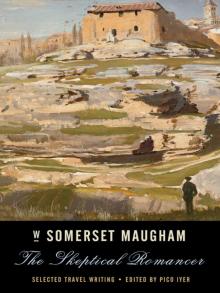 The Skeptical Romancer: Selected Travel Writing
The Skeptical Romancer: Selected Travel Writing The Summing Up
The Summing Up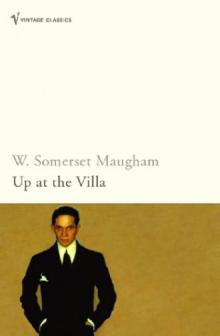 Up at the Villa
Up at the Villa The Razor's Edge
The Razor's Edge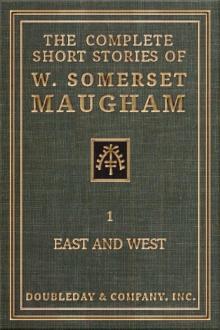 The Complete Short Stories of W. Somerset Maugham: East and West (Vol. 1 of 2))
The Complete Short Stories of W. Somerset Maugham: East and West (Vol. 1 of 2))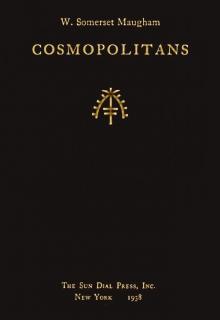 Cosmopolitans
Cosmopolitans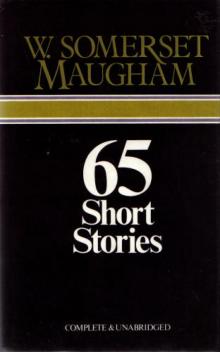 65 Short Stories
65 Short Stories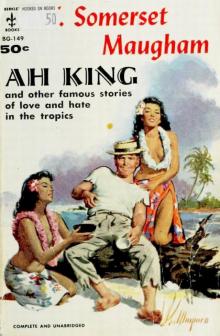 Ah King (Works of W. Somerset Maugham)
Ah King (Works of W. Somerset Maugham) Collected Short Stories: Volume 1
Collected Short Stories: Volume 1 Collected Short Stories Volume 2
Collected Short Stories Volume 2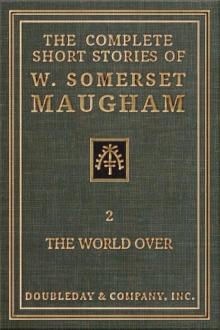 The Complete Short Stories of W. Somerset Maugham - II - The World Over
The Complete Short Stories of W. Somerset Maugham - II - The World Over Collected Short Stories Volume 4
Collected Short Stories Volume 4 Theatre
Theatre Short Stories
Short Stories Then and Now
Then and Now The Favorite Short Stories of W. Somerset Maugham
The Favorite Short Stories of W. Somerset Maugham Of Human Bondage
Of Human Bondage The Magician
The Magician The Great Exotic Novels and Short Stories of Somerset Maugham
The Great Exotic Novels and Short Stories of Somerset Maugham A Writer's Notebook
A Writer's Notebook Christmas Holiday
Christmas Holiday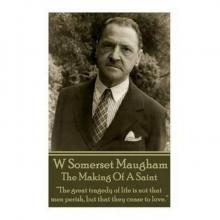 The Making of a Saint
The Making of a Saint Merry Go Round
Merry Go Round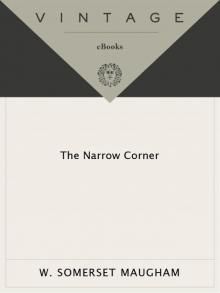 The Narrow Corner
The Narrow Corner Collected Short Stories Volume 3
Collected Short Stories Volume 3 Ten Novels and Their Authors
Ten Novels and Their Authors Ashenden
Ashenden The Moon and Sixpence
The Moon and Sixpence Cakes and Ale
Cakes and Ale Liza of Lambeth
Liza of Lambeth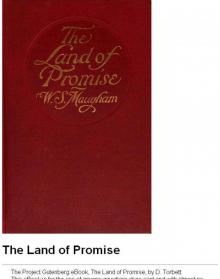 The Land of Promise: A Comedy in Four Acts (1922)
The Land of Promise: A Comedy in Four Acts (1922) A Writer's Notebook (Vintage International)
A Writer's Notebook (Vintage International)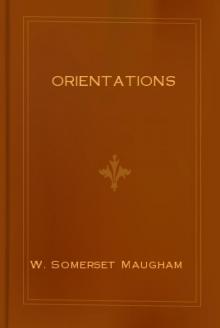 Orientations
Orientations Selected Masterpieces
Selected Masterpieces Mrs Craddock
Mrs Craddock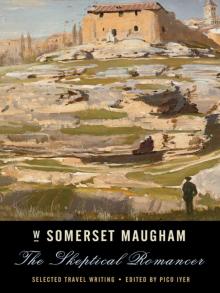 The Skeptical Romancer
The Skeptical Romancer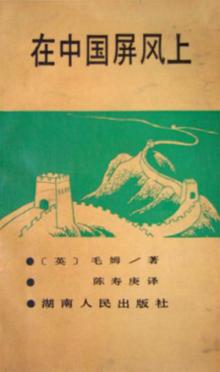 On a Chinese Screen
On a Chinese Screen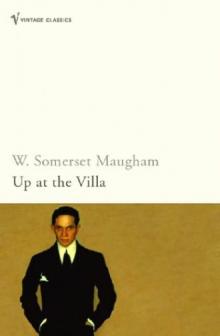 (1941) Up at the Villa
(1941) Up at the Villa The Great Novels and Short Stories of Somerset Maugham
The Great Novels and Short Stories of Somerset Maugham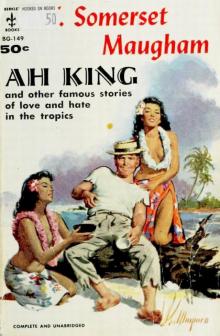 Ah King
Ah King The Explorer
The Explorer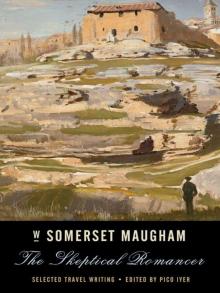 The Skeptical Romancer: Selected Travel Writing (Vintage Departures)
The Skeptical Romancer: Selected Travel Writing (Vintage Departures)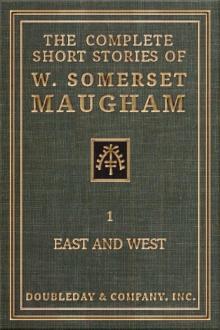 The Complete Short Stories of W. Somerset Maugham - I - East and West
The Complete Short Stories of W. Somerset Maugham - I - East and West